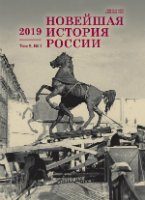Путь в никуда: социальная политика Комитета членов Всероссийского учредительного собрания (июнь — ноябрь 1918 г.)
Road to Nowhere: Social policy of the Committee of the All-Russian Constituent Assembly (June — November 1918
Author(s): V. M. RynkovSubject(s): Civil Law, Military history, Social history, Politics and society, Pre-WW I & WW I (1900 -1919), Interwar Period (1920 - 1939)
Published by: Издательство Исторического факультета СПбГУ
Keywords: Komuch; social policy; civil war; political regime; legislation; Povolzhye; Urals;
Summary/Abstract: Social policy was one of the most important components of politics in Komuch, most fully reflecting the specifics of a “third way” in the Civil War. Historiographical analysis shows that, until now, scholarly attention has focused on its individual aspects, and a holistic view has not yet been created. The article reveals specifics of interactions between the authorities and society in Komuch. Inclusion of many heterogeneous associations in the decision-making process led to the formation of a polycentric model for developing social policy, which was implemented as a result of the interaction of different political forces. The main facets of Komuch social policy included regulating property relations, social and labor spheres, assistance to refugees, support for military personnel and their families, social transfers, and education policy. Except for the first two, these policies remained in their infancy. Along with beginning to return property, the Volga government continued seizures, and transferred most of what was nationalized to local governments. Numerous prescriptions in the field of workers' legislation focused on establishing a social compromise, to the achievement of which there were no material and political prerequisites. Komuch sought to minimize social spending, to free up the state apparatus by shifting social obligations to local governments, entrepreneurs, and public organizations. Assistance to socially disadvantaged groups was episodic, mainly at the last stage of the existence of the Komuch authorities and aimed mainly at helping state officials. Regulatory prescriptions were not consistent with declarations and did not correspond to main groups’ ideas about social justice and could not be realized in the current social situation. Local governments, the army, powerful public corporations, such as trade unions, business organizations, neighborhood councils and others, ignored the prescriptions of the authorities and acted on their own interests.
Journal: Новейшая история России
- Issue Year: 9/2019
- Issue No: 26
- Page Range: 110-132
- Page Count: 23
- Language: Russian

